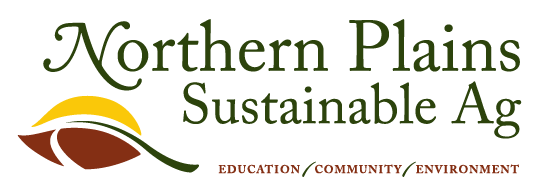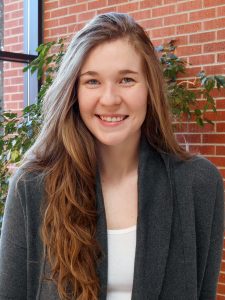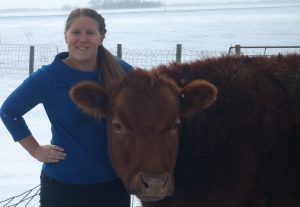NPSAS Scholarship
Eligibility Requirements:
1. The parents/guardians and/or applicant must be current members of NPSAS.
2. Applicant must be at least a first-year student at a college or technical school with proof of acceptance to an accredited post secondary educational
program. The award is open to students pursuing any level of degree or certificate from Associates to PhD.
3. The Scholarship Selection Committee reserves the right to review and select other candidate(s) who may not meet all of the aforementioned guidelines but
who would fulfill other needs in a sustainable society.
A complete application submission includes the following:
1. Completed application form (Link below or by contacting the office)
2. A recommendation letter from the applicant’s college advisor and/or supervising faculty indicating their acceptance into a sustainable agriculture related
program.
3. Two additional letters of recommendation (at least one must be from an individual familiar with the applicant’s sustainable agriculture work/goals).
Scholarship Application
NPSAS is grateful to all who have generously donated to this fund.
The recipient will furnish their biography and a photo, and will also consent to have both appear in NPSAS promotional materials such as The Germinator newsletter, Facebook and e-Sprout. Updates on your career would also be welcomed by the membership who have worked hard to make this opportunity possible. The scholarship check will be mailed directly to the awardee after they submit proof of completion (for example, final grades) from last semester. This can be e-mailed to info@npsas.org.
NPSAS Scholarship Recipients
2019

Jesse Puka-Beals
Originally from Lexington, Massachusetts, Jesse became interested in agricultural systems when working on a farm at age sixteen. His interest in agriculture was fueled by environmental concerns and broadened to include social and political concerns after experiences like traveling to Myanmar. After graduating with a degree in agricultural sciences from Cornell University, Jesse moved to Fargo North Dakota to begin a masters program at North Dakota State University investigating organic weed management approaches that are effective in the short growing seasons of the northern Midwest.
2018
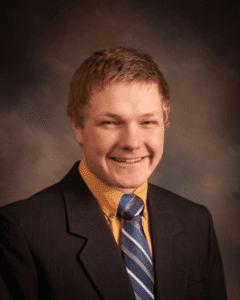
Ben Stiegelmeier
Ben was born and raised on one of the pioneer organic farms in South Dakota. The passions for hard work and producing healthy food were instilled at a very young age. He worked in every aspect of the farm alongside his mother and older siblings after his father’s death in 2002. Ben knows first-hand both the blessings and the trials of farming. Bumper crops, neighbors, breakdowns on a Saturday, weeds, and overcoming huge losses have all been complicated blessings that this farm kid has had to navigate. Some of them were more fun than others, but by the grace of God now they are all settled.
Now as a college student at Patrick Henry College in Purcellville, VA, there are new and completely different sets of difficulties to overcome. Classrooms, books and dress pants are a huge change from the saddles, tractors and coveralls of the past. Ben shared a little story to illustrate this. During finals week a professor asked Ben how the adjustment to student life had been.
“It was really hard in the beginning,” Ben answered. “Now, it is still an up-hill climb, but it’s not quite so steep.”
“You know what they say about up-hill climbs,” his professor inquired.
“What’s that?” Ben asked.
He replied, “They build muscles.”
By going to college, Ben hopes to become a more effective communicator and advocate of agriculture in both the public and private spheres. This is just one way he continues to grow as a champion of learning new information, growing better crops and informing fellow citizens that producing healthy food is important for a stable civilization. Ben thinks it is crucial to support the next generation in agriculture. “It is very humbling,” he added, “that there are people who see enough potential in me to warrant such a generous investment. Members of NPSAS and friends, thank you for helping me ‘build muscles.’”
2017
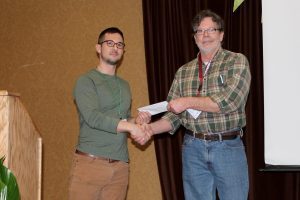 Kenneth Beamer Receives 2017 Scholarship
Kenneth Beamer Receives 2017 ScholarshipNPSAS Board Member, Steve Dahlberg, presented Kenneth with a check for $1,000.
Kenneth Beamer
An Iowa native, Kenneth Paul Beamer attended Iowa State University, studying Horticulture with an emphasis on food production and environmental impacts. Paul focused on sustainable practices which use ecological processes to mitigate anthropogenic shifts in resources and nutrient cycles. His interest shifted to organic production when he worked on the Student Organic Farm at ISU, where volunteering led to a management position. By growing a variety of crops through rotations, Paul found that healthy soils and pest management depended on crop diversity. Through donating excess food to shelters, he also considered how diversity of food was essential for improving the wellbeing of society.
After receiving his B.S., he worked as a Research Analyst with the University of the Virgin Islands where he continued to practice and research sustainable agriculture. The experience of working with tropical agriculture both broadened his worldview while also galvanizing passion for sustainable and organic practices. The need to be sustainable in the tropics had drawn parallels with agriculture throughout the world. Interested in weed reduction and prevention strategies, Paul applied and was accepted to a graduate program at North Dakota State University. His advisor, Dr. Greta Gramig is prominent in the field of sustainable agriculture and has shifted research focus to organic production in order to assist producers interested in transitioning to organic, as well as those interested in ecologically-based weed management.
Paul’s greatest fear is the collapse of our food systems. His interests currently within agriculture pertain to helping people in cities becoming food secure. As civilization is built upon agriculture, his concern lays with resilient and independent food systems.
2016
Samantha’s passion for agriculture comes from growing up in a small farming community in southern Minnesota and seeing her dad’s love of farming and his dedication to the land. Samantha credits her undergraduate career at NDSU, she received a B.S. in Plant Sciences in December of 2014, and simultaneous work experience with her conversion to organic agriculture. Because she has a background in conventional agriculture and believes that implementation of sustainable tactics will be vital to the future of agriculture, Samantha will be an important bridge between those two fields.
She would like to thank her graduate adviser, Dr. Greta Gramig, for being an instrumental guide, her parents, Todd and Mara Olson, for being inspirational and for their confidence, and her boyfriend, Dave, for his unyielding support.
When asked where Johanna sees the future of agriculture heading, she responded, “The idea of the future of agriculture has changed with every decade. What was considered “correct farming practices” are some of the reasons why the Great Depression happened. In the 1990s GMOs were said to be the next future of agriculture. Now, in 2016, I believe regenerative agriculture is key to the future of this earth and all that inhabit it. Restoring our soil and managing animals in a holistic method is something I have a vast interest in learning more about. I am passionate about agriculture and people. With that, I want to provide healthy, nutrient-filled food for consumers. People should be able to have the option of choosing non-GMO, organic or locally-produced products. I believe it would be worthwhile work to provide those options to any consumer.”
Last fall Johanna worked at Brown’s Ranch near Bismarck, N.D. and will be interning there beginning early April. Johanna is the daughter of Susan and Richard Long. In the future Johanna plans to return to the ranch.
2014
While in college, she had many opportunities to learn about conventioanl farming and ranching. These opportunities increased her awareness that sustainable agriculture is the right path, not only for Melany, but also for the animals she raises.
Melany feels the NPSAS scholarship is a good investment in the future of agriculture as education is an important aspect of making good, responsible choices in the agricultural field. With more people wanting to know where their food comes from, she wants to be able to give them a product she can stand behind. Raising grassfed cattle gives her that.
She heard about NPSAS through her future in-law’s, Lee and Noreen Thomas, long-time NPSAS members. She became a member a few short months ago and feels excited to be part of something others like her believe in as well.
2013
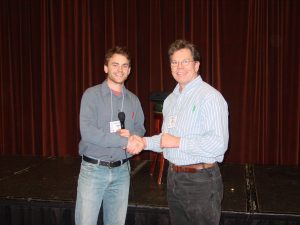 Ben Arlt, 2013 scholarship recipient
Ben Arlt, 2013 scholarship recipient
NPSAS Board Member, Steve Dahlberg, presented Ben with a check for $1,000.
